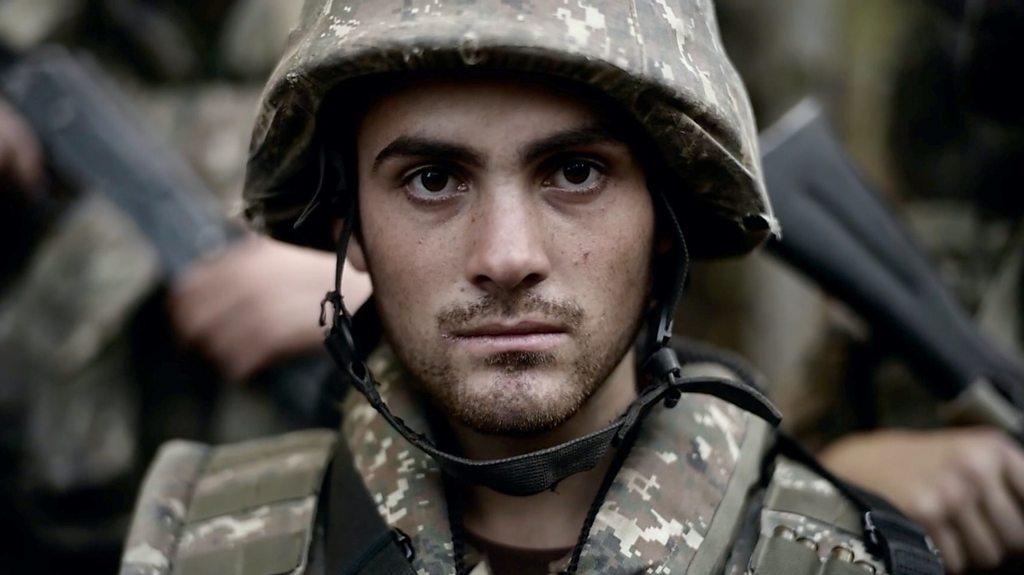Nagorno-Karabakh conflict: Human cost of two nations fighting for 'Motherland'
- Published
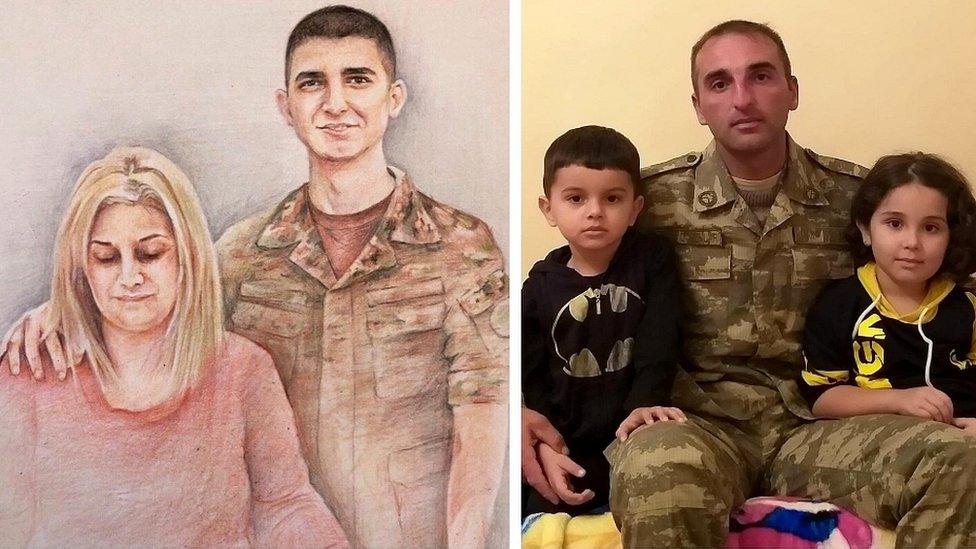
Sargis Hakopyan drew this image of himself and his late mother; Fariz Gasanov is pictured with his children on the right
Nobody knows how many people have lost their lives so far in the latest war for Nagorno-Karabakh. Russia's president said recently that 5,000 people had died - soldiers and civilians. These are the stories of some the men who died fighting on both sides.
"It's hard for me but I am proud that my son's blood was spilled on our soil," says Mushkenaz Haziyeva over the phone from her home in the Azerbaijani town of Kurdamir.
Ziyadhan Aliyev, 24, studied computer programming and loved reading history books. He was in no hurry to get married. He was waiting a few more weeks for his military service to end but died on 1 October, days after the conflict began.
Ziyadhan was killed in the battle to recapture the village of Talish.
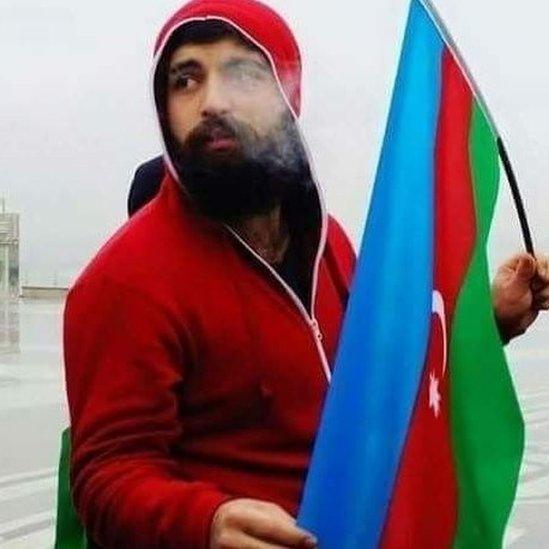

His family came originally from a village called Soltanli, further south in the Jabrayil region. They and hundreds of thousands of other ethnic Azerbaijanis were forced to abandon their homes when the territory fell to the Armenians in the 1990s.
Ziyadhan's father fought in that first Karabakh war. A ceasefire was declared at the end of it but no peace treaty was signed.
The Nagorno-Karabakh region is internationally recognised as part of Azerbaijan, but it is controlled by ethnic Armenians.
"If you mix water with soil, you get dirt. If you mix soil with blood, you get the Motherland," his mother says.
The Azerbaijan-Armenia conflict flared up on 27 September.
Azerbaijan does not give details of its losses, but there have been many reported funerals and pictures of fresh graves at military cemeteries.
Officially, more than 1,100 Armenian servicemen are known to have been killed. The majority of Armenian soldiers killed in action have been young recruits, born after 2000.
More than 130 civilians have been killed on both sides.
Soltanli is among more than 100 villages recently recaptured by the Azerbaijan army and Mushkenaz Haziyeva believes military action is the only way to get the territory back.
"We will go back there, we will build homes and schools, grow our gardens. On the one hand my heart is bleeding because I have lost my son, but on the other I am full of joy because finally we won't have to be the refugees anymore."



This conflict is going on while the coronavirus pandemic rages in both countries.
But we know that Armenia is going through many more funerals for fallen soldiers than for victims of Covid-19.
For a small nation of three million people, the human cost of this conflict has been immense.
Sargis Hakopyan, 19, was a promising young artist who learned to draw from an early age. His cousin, Sed, remembers how he painted his first fish when he was three.
In July 2019, Sargis was drafted into the Armenian army. Soon afterwards he lost his mother, to whom he was deeply attached.
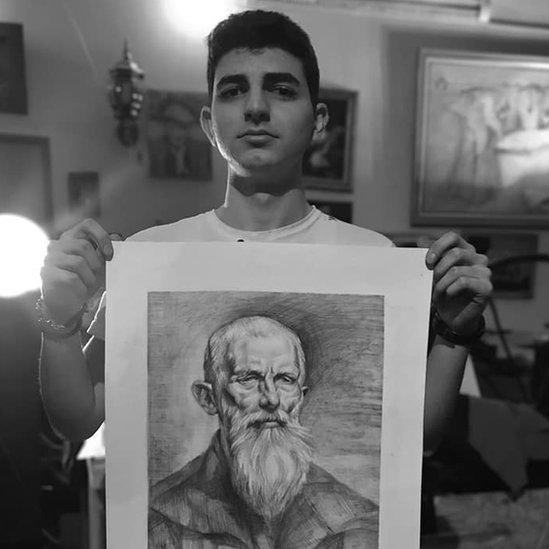
His family was informed about his death on 17 October. They have yet to receive his body.
Sargis was a creative soul, his cousin remembers. He was good at singing and poetry, had lots of female friends and was loved by everyone wherever he went, he says.
"Sargis dreamt of entering the Yerevan Academy of Fine Arts," says his childhood friend Anush Khachatryan. "No-one can fill his place in my heart. Never."
Armenians on the front line in Nagorno-Karabakh

Both nations are gripped with the pain of loss, but Azerbaijan's military advance has boosted public morale at home and there appears to be overwhelming support for continuing the war.
Aziza Gasanova, 27, is mourning her husband Fariz Gasanov.
"I last saw him on 10 October. He came home to have a quick shower but didn't even eat. He just took three pieces of chocolate, said he was in a rush and kissed our children," she recalls.
Fariz, 34, was reserved but kind, his wife says. He joined the army when he was 19 and was dedicated to the Karabakh issue. Often he would say that they had inherited the problem from their fathers, but it was up to his generation to ensure Azerbaijan returned its lost territories, she says.
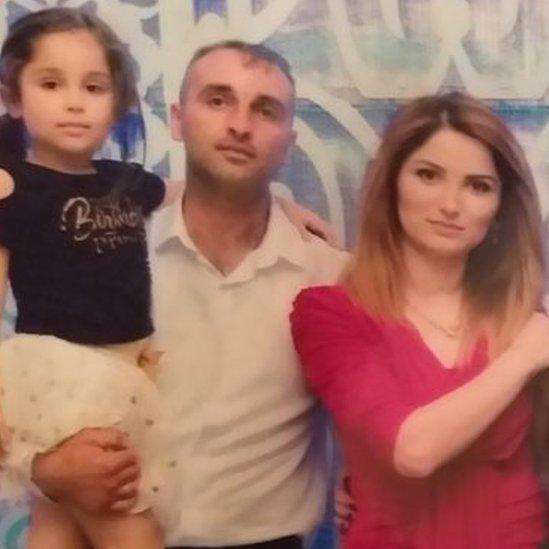
Aziza Gasanova with her late husband Fariz and their daughter
His phone calls stopped on 11 October. A few days later Aziza learned that he was killed in a battle for the town of Fizuli, which the Azerbaijani army had recaptured. He was buried five days later.
"My daughter says that dad has become an angel and is looking at us from heaven. She repeats my words. The children don't understand it yet that he is no longer with us, " says Aziza.
The family always kept an Azerbaijani flag in the house and Aziza now hopes her four-year-old son Ruslan will one day join the army and become a general.
"I will be teaching my children to hate Armenians because they killed our sons. So many women became widows, mothers lost their children. But this is our land. Everybody knows it's Azerbaijani territory."

For more on the Karabakh conflict:

Ethnic Armenians see Karabakh, which they call Artsakh, as their "Motherland" too - the last outpost of their ancient Christian kingdom. And many are ready to sacrifice their lives for it.
Davit Hovhannisyan, 25, wanted to pursue a military career from a young age. In his childhood he would dress up in military uniform and pose for photographs.
He was killed on 10 October in the south-eastern part of Nagorno-Karabakh.
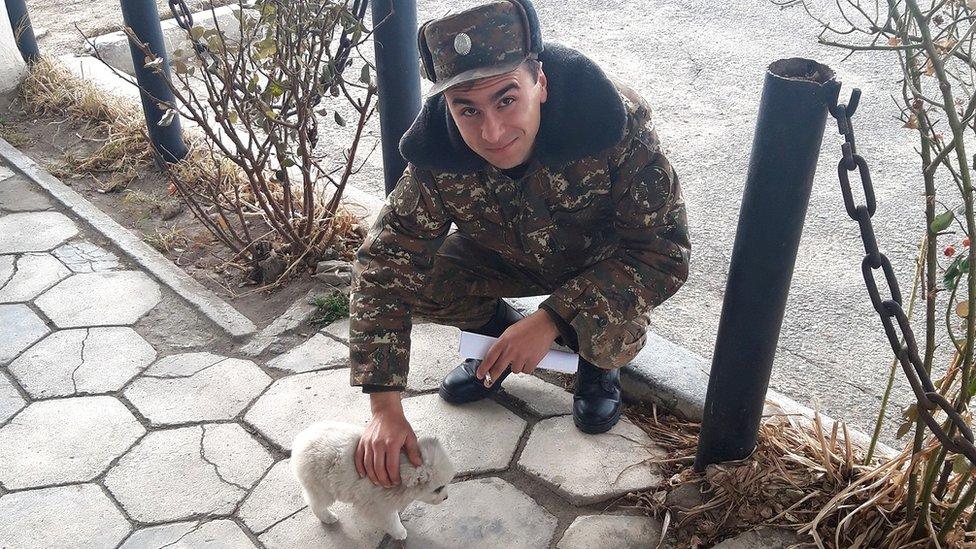
Davit Hovhannisyan was keen on serving in the military from childhood
His cousin, Nellie Petrosyan, remembers a man who was good at singing patriotic songs and liked to crack jokes with his family.
"I last saw him in September; we went to visit a 10th-Century monastery in our village of Shatin. Davit collected hawthorn branches for his sister. He really loved nature. It was a happy day and I could never have imagined it would be our last.
"I want the Armenians and the world to remember Davit as a real hero, and a real patriot."
The war over Nagorno-Karabakh is now in its fifth week, and there is no sign of easing in the fighting from either side.
Three ceasefires have come and gone and Azerbaijan continues its military advance. It has recaptured a substantial amount of territory previously under Armenian control and Armenia's prime minister has vowed to "fight for every last stone, centimetre and every millimetre" of land in Karabakh.
- Published12 November 2020
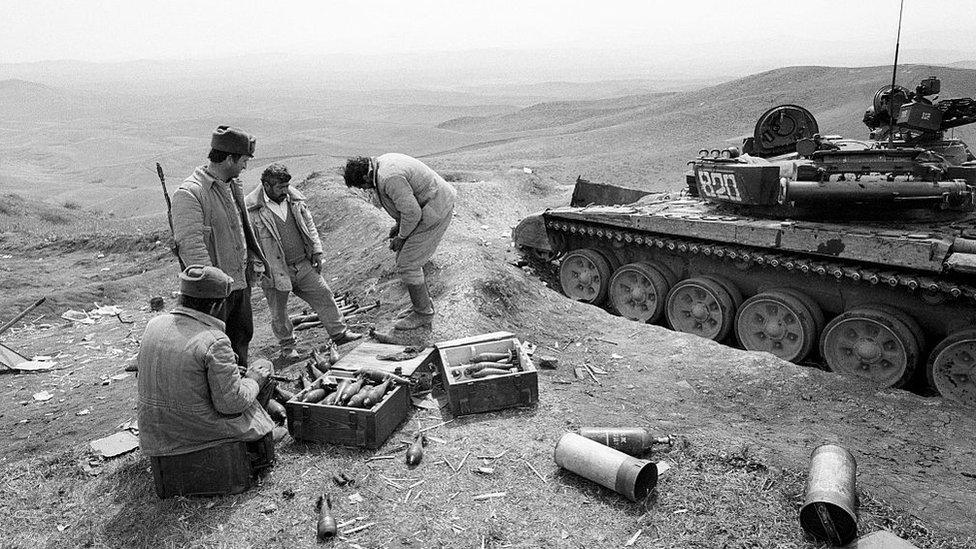
- Published30 October 2020
